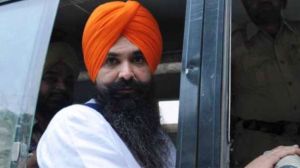Enter Sheila Aunty, the CM who understates with a plomb
NEW DELHI, January 10: It all began with the arrival of chrysanthemums at the Old Secretariat in early December. Not too many noticed it ...

NEW DELHI, January 10: It all began with the arrival of chrysanthemums at the Old Secretariat in early December. Not too many noticed it then. But after a month of the new government, the change was palpable.
For the mandarins of Delhi government, the suave and unassuming Sheila Dikshit is a culture shock. No more loud parleys in and outside the Chief Minister’s Office. No entourage of political sidekicks who believe they are de-facto heads of government. No aplomb about security.
A senior mandarin sums up: “Auntyji believes in understatement”.
The Delhi administration is getting used to a Chief Minister who wants “time to understand Delhi”. “She believes that she has to know more about the working of the Capital,” says a mystified bureaucrat, who adds: “We usually deal with politicians who think they know everything about the everything”.
“Too gentle for governance,” is how the deputy commissioners described her soon after a meeting. “She seems to believe that officials will get self-motivated and do the work. Does not seem to realise that bureaucrats here are used more to the stick than the carrot,” says an official.
“She began by saying you are the masters of the districts. She didn’t realise that unlike in other states, the district commissioners do not even have the police with them,” he adds.
Another deputy commissioner who had worked closely with Sushma Swaraj says, “Sushma was more pushy, was in greater control of the situation. But then she was in a hurry”.
Dikshit’s style of functioning is shocking the system used to beating about the bush. There are no long-winding meetings with bureaucrats, no stormy cabinet meetings and no impromptu press conferences.
“Our auntiji believes in her boys and girls,” says a senior official and adds: “There is no regular interference with the ministries. And unlike in the BJP times, there is very little misunderstanding”.
She steps in only when there is a demand by the minister concerned. Like at a meeting with the Delhi Jal Board, where she very candidly told the Chief Executive Officer, Baleshwar Rai: “If my MLAs gherao you because of water shortage, I shall not stop them from doing it. Please do keep that in mind when you’re trying for solutions”.
But normally, she leaves the ministers with their portfolios and takes stock through brief meetings or even just phone calls. Where it is necessary, the bureaucrats concerned are dealt with by the principal secretary to the CM.
But bureaucrats do not find it easy to compare her with Sahib Singh Verma or Sushma Swaraj.
Under oath of secrecy and behind closed office doors they confide. “Sahib Singh was rustic. He was straight when not confused. His cabinet was divided because of the Khurana factor. Sushma was very autocratic. Every power had to converge at her door,” they say. “Dikshit has a loyal cabinet which is thankful to her for reposing faith in them when there were 51 MLAs to choose from,” points out a bureaucrat on his way out of Delhi.
The staff of the Old Secretariat finds her subtlety a contrast to her latest predecessor, Sushma Swaraj. “There are no sirens on her cavalcade. Earlier, there was a ruckus when the CM was moving,” says an old office hand.
“She always sits with the driver. People stand at the back door of her car to open the door, but she would get off from the front on her own,” says an official of the Legislative Assembly.
Many MLAs are disgruntled that they have not been made a part of the action. “But behenji knows that not taking a decision is a decision too,” says one reconciled MLA.
Photos



- 01
- 02
- 03
- 04
- 05




























